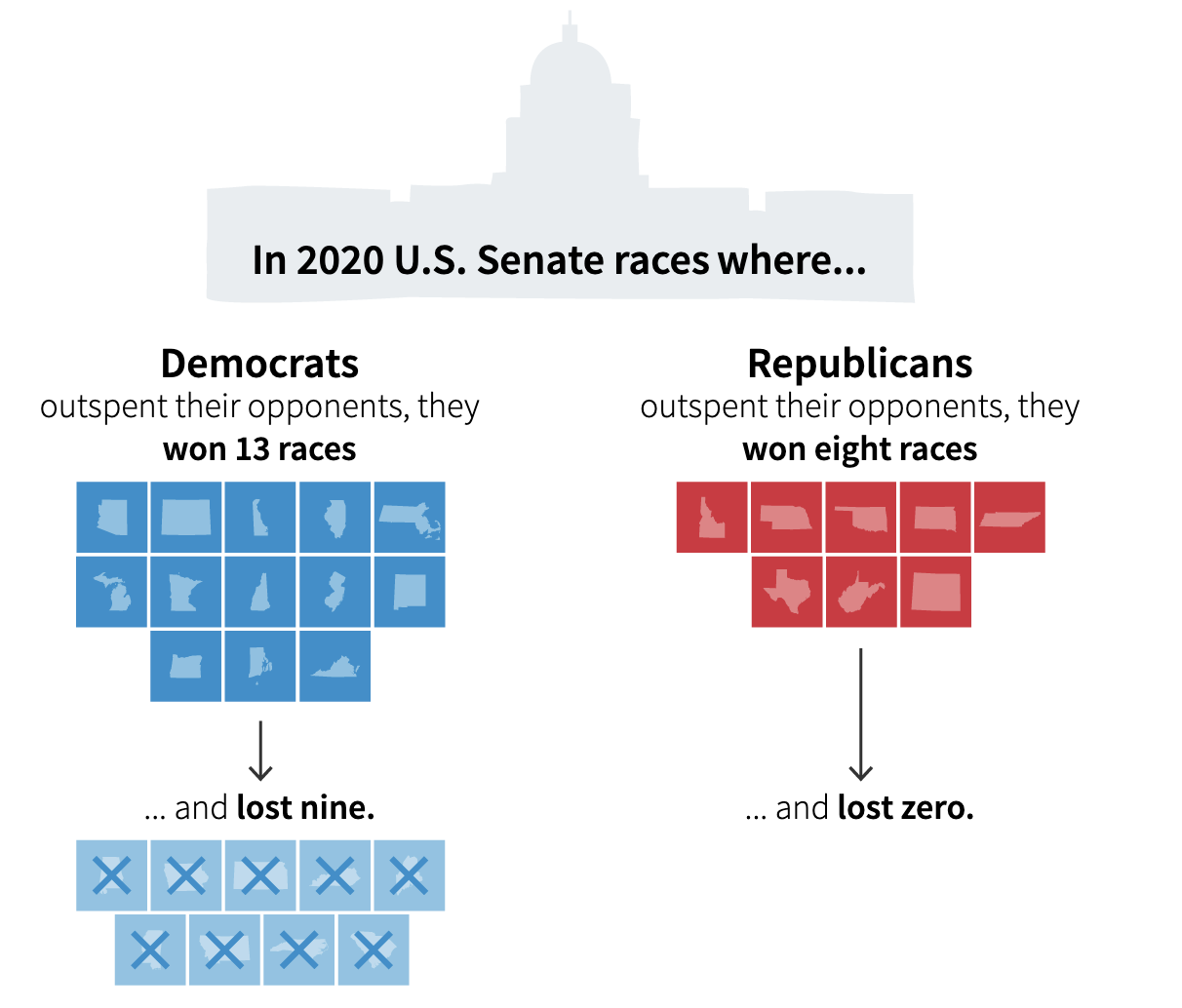Senate Debate Season: Battleground Edition!
Grab your popcorn, folks. It’s the moment all you political junkies have been waiting for: Senate debate season! We'll be paying especially close attention to the October 25 Senate debate in Pennsylvania, where Democratic candidate John Fetterman—who had a stroke in May that kicked him off the campaign trail for several months—will debate Republican celebrity television host Dr. Mehmet Oz. But here are a few other dates we’re adding to our calendars:
Wisconsin: GOP Sen. Ron Johnson will debate Democrat Mandela Barnes on October 7 and October 13.
Georgia: Democratic Sen. Raphael Warnock will debate Republican Herschel Walker October 14.
Ohio: Democratic Rep. Tim Ryan will debate Republican J.D. Vance on October 10 and 17.
Arizona: Democratic Sen. Mark Kelly will debate Republican Blake Masters on October 6.
Washington: Democratic Sen. Patty Murray will debate Republican Tiffany Smiley on October 23.
North Carolina: Democrat Cheri Beasley will debate Republican Rep. Ted Budd on October 7.
It appears that this season, candidates in most Senate battlegrounds are participating in only one general election debate, if they’re agreeing to debate at all. Of course, the rise of social media gives candidates more opportunities to reach their voters directly without the risk of taking tough questions about their records. A single Facebook post may be seen by more eyeballs than a televised debate. There’s also a fair amount of data suggesting that the people who do tune into the debate already have made up their minds—which means the only answers that get seen by persuadable voters are the ones that make news. And only bad answers make news.
In 2012, Indiana Republican Senate candidate Richard Mourdock said during a debate that pregnancy during rape is “something God intended.” He lost to Democrat Joe Donnelly by more than 5 points.
Last year, Democratic gubernatorial nominee Terry McAuliffe said parents shouldn’t “be telling schools what they should teach” in answer to a debate question. The clip was played across cable news and GOP ads for the rest of the cycle. Glenn Youngkin became the first Republican to win a statewide race in Virginia in 12 years.
“If you’re not a candidate in a vulnerable race, or has to kind of prove themselves, there’s just a lot more downsides to having more debates,” election analyst J. Miles Coleman from Sabato’s Crystal Ball said. “It’s often one of those things where if you do a good job, that’s the standard, but if you mess up, that's when it will get played against you.”
In the end, candidate debates at every level are usually more about expectations than anything else. Remember back to 2000 when George W. Bush was supposed to be the lightest weight, dumbest person ever to run for president? Ahead of the first debate, suddenly Al Gore had a newfound respect for his opponent.
“He's an excellent and formidable debater,” Gore pleaded. “[Ann Richards is] a better debater than I am. ... She's got a very quick wit and silver tongue and is just as smart as a whip—and he beat her in that debate,” he argued, referring to Bush’s gubernatorial debate with Richards in 1994.
Looking back, communications director Karen Hughes said, “In debates, you run against expectations almost as much as you run against your opponent.” Bush went in with low expectations and won all three debates.
One U.S. Senate candidate, Republican Herschel Walker in Georgia, has already taken that lesson to heart ahead of his upcoming debate against Democratic Sen. Raphael Warnock.
“I’m a country boy. I’m not that smart,” Walker recently told Savannah Morning News. “He’s a preacher. (Warnock) is smart and wears these nice suits. So, he is going to show up and embarrass me at the debate Oct. 14th, and I’m just waiting to show up and I will do my best.”
Of course, there’s lowering expectations and then there’s insulting yourself. His campaign says he was being sarcastic, but to paraphrase Nebraska Sen. Roman Hruska during a 1970 debate over a Supreme Court nominee, “Even the not that smart are entitled to a little representation, aren't they?”
Fundraising Drama in Arizona Continues
Republicans are busy haggling over who ought to be footing the bill for GOP nominee Blake Masters’ lackluster fundraising haul this cycle: the Mitch McConnell-aligned Senate Leadership Fund, the National Republican Senatorial Committee, or tech billionaire Peter Thiel.
But fundraising as a metric is very different from spending. Fundraising numbers from a candidate—how much the candidate raised, what percentage is from in-state donors, how much was raised in under-$200 increments—can all be an indicator of voter enthusiasm.
Spending used to be the most important indicator—i.e., the candidate who spent more almost always won. But that was then. Now, the spending numbers include millions coming from independent groups like super PACs that are far less efficient because of campaign finance rules and have no relationship to voter preferences. Remember this graphic from 2020?

To be clear, it’s not that Democrats are uniquely bad at spending money. It’s that spending is no longer closely correlated with winning. Clinton spent twice as much as Trump in 2016. The Trump universe outspent Biden in 2020.
One Republican strategist tells us that the media’s obsession with fundraising this cycle is misguided, and that another million from McConnell or Thiel won’t tip the scale one way or another.
“Tell me in the middle of October what Joe Biden's approval is, where the inflation rate is, and what the wrong track is, and I’ll be able to make a better prediction of what's gonna happen,” the Republican strategist said. “But spending in Arizona isn’t going to change those three factors, and that’s what’s really gonna drive this election—and on that, whether the Democrats are effective in pushing the message to peel away votes in the suburbs.”
Sounds right.
Big Picture
Over at AEI, Ruy Teixeira, Karlyn Bowman, and Nate Moore have compared demographic voting patterns from last month to the same month in 2018 and 2020. I don’t think these numbers say much about who will hold the Senate, for example, but they say a lot about what the two political parties will look like in 10 years.
The two big things: the Hispanic vote continues to leak out and the education gap widens. From their findings:
The average Hispanic advantage for the Democrats in the last month is around 19 points. This is a further decline from the Democrats’ relatively low 25-point advantage among this group in the 2020 presidential election and a big decline from their 35-point advantage in the 2018 midterm. The trend in the last month among Hispanics has also been negative for the Democrats, around a 2-point decline.
The data indicate a yawning 42-point gap in the last month between the Democrats’ White college and White non-college support. The Democrats are carrying White college voters by 13 points while losing White non-college voters by 29. The analogous gap in 2018 was 27 points and in 2020, 33 points.
Abortion Drops, Immigration Rises
“Americans' Google searches and story interactions around crime and immigration are eclipsing abortion and the FBI search of Mar-a-Lago,” according to the Axios midterms dashboard.
Sure, this is good news for Republicans. But it’s still only September. I predict these cross-currents will maintain this ebb and flow. The question is what is front of mind for American voters when early voting starts in earnest in late October through Election Day.

But Another Thing
Democrats are outraising Republicans and outpolling expectations, but the Washington Post’s David Byler sees one indicator that looks better for Republicans.
“According to pollster John Couvillon, 52 percent of 2022 primary voters cast ballots in GOP races, while 48 percent voted in Democratic races,” Byler writes. “That’s a good sign for Republicans. High primary turnout signals enthusiasm for the general election — and the party with the stronger primary turnout typically does better in the midterms.”
Sure, but the data like this—collected over an entire primary season—is a little difficult to lump together. Gas prices dropped and the Supreme Court overturned Roe—two potentially highly relevant events for voter turnout—toward the end of the cycle. Byers actually separated the pre- and post-Dobbs primaries. Republicans enjoyed an 8-point advantage before June but still had a 2-point advantage after.
And even ignoring a shifting political landscape over the period, primary voters had very different reasons to show up. A lot of these Republican contests were pitched to voters as a fight between two wings of the GOP, which might have ginned up turnout and created an asymmetry that is hard to account for.
Bottom line: As you can see from Byler’s chart below, primary turnout on both sides was high this cycle. Republicans went up a little and Democrats went down a little from the last midterm. Is this a predictive data point for this cycle? My gut says no (more volatile economy, less stable parties), but it has been for the last five so it’s worth looking at.

Throw the Bums Out
“Approval of Congress, which has been trending higher since August, is now 23%, its highest point in 2022,” reports Gallup. In June, the number dipped below 20 percent, but we’re still in root canal levels of popularity.







Please note that we at The Dispatch hold ourselves, our work, and our commenters to a higher standard than other places on the internet. We welcome comments that foster genuine debate or discussion—including comments critical of us or our work—but responses that include ad hominem attacks on fellow Dispatch members or are intended to stoke fear and anger may be moderated.
With your membership, you only have the ability to comment on The Morning Dispatch articles. Consider upgrading to join the conversation everywhere.